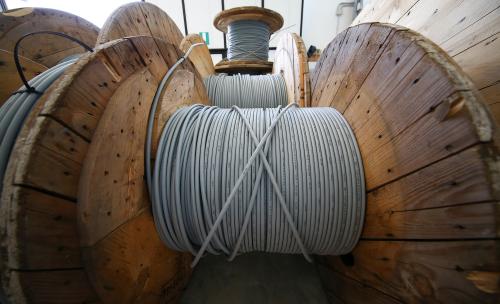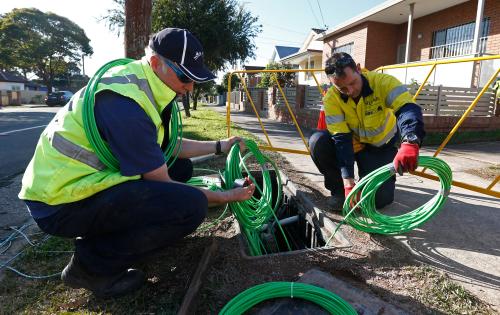In 1994 U.S. Senator Daniel Patrick Moynihan decried what he felt was an ongoing redefinition of acceptable behavior designed to normalize what had previously been unacceptable. He described this phenomenon as “Defining Deviancy Down.” The Trump Federal Communications Commission (FCC) is following a similar “defining down” policy when it comes to what is acceptable in the all-important networks that connect us.
By quietly altering the measuring sticks, the Trump FCC is “Defining Digital Down” to reset the definition of acceptable behavior by the companies that control America’s networks. Instead of working to build the best possible future for Americans, the agency’s new definitions lower expectations, declare victory where there is none, and set the stage for anti-consumer consolidation.
Instead of challenging American companies to, for instance, raise average internet connectivity speeds to levels above those of Kenya, the Trump FCC is seeking to redefine downward what constitutes high-speed broadband. In preparation for the congressional-mandated annual report on the status of broadband deployment in the United States (so-called “advanced telecommunications services”), the FCC seeks to define downward the definition of broadband. Stealthily, this is accomplished by simply changing a conjunction.
In 2011, in a unanimous bipartisan decision, the FCC said Americans need access to both wired AND mobile broadband. Reversing that bipartisan unanimity, the Trump FCC now proposes to change “and” to “or” – a seemingly simple conjunction change with profound impact. Declaring mobile the same as fixed broadband defines broadband down from 25 megabits per second (mbps) to only 10 mbps, while defining up, via mobile data caps and higher prices, what consumer must pay.
Changing the measurement of what constitutes broadband is a sleight of hand that will also allow the FCC to “conclude that Americans’ broadband needs are being met – when in fact they are not,” a dozen Democratic Senators wrote the FCC Chairman. As this thoughtful video from Vox shows, changing the measuring stick will allow the Trump FCC to claim success in bridging the digital divide. With the change of a conjunction, the 23 million Americans the Obama FCC determined did not have adequate broadband access disappear. Trump has “solved” the digital divide! All it takes is to forget the people involved and what their real needs may be and simply define digital down.
The big companies that control broadband access, usually on a local monopoly basis, love this retreat for another reason: it opens the door for consolidation. Now, when it comes to assessing how many “broadband” providers are “competing” in a market, the denominator is much larger, thus the effect of any new consolidation is made to appear much smaller. The Trump FCC has already pulled such a trick by defining downward the method of counting television subscribers; a decision that conveniently helps the pro-Trump Sinclair Broadcasting become the largest broadcaster in the nation.
Defining down is also underway in regard to wireless service. On a party-line vote, over the objections of the Democratic Commissioners, the FCC last week reversed long-standing policy and declared the wireless market to be “effectively competitive.” In making this leap to reverse the last six Commission reports on wireless competition, the Trump FCC admitted they could not really define what constituted “effective competition” and thus they did not even try! In a breath-taking statement, the report states, “We do not attempt to do a full market definition or market power analysis…as this would involve an extremely detailed analysis of supply and demand factors at the national and local level. Instead, we consider a number of facts and characteristics of the provision of mobile wireless services, which taken together, indicate that there is effective competition.”
Defining digital down, apparently, doesn’t actually require a definition, just an assertion. Such a fact-less assertion couldn’t come at a more convenient time. Sprint and TMobile are reportedly far along in merger negotiations, a fact that couldn’t have been lost on the FCC leadership. The Obama FCC and Justice Department discouraged such a merger because it would reduce the number of national wireless providers from four to three. Now that the Trump FCC has declared the wireless market to be “effectively competitive” the stage is set for that merger and the end of the cost-lowering, service-improving competition that having four competitors has brought to Americans.
Changing the measuring stick changes the outcome. Imagine how the results of last weekend’s football games could have changed if a first down was only nine yards. Quietly, and with little notice, the agency that is supposed to be protecting consumers is changing its definitions in a manner that favors the corporations they are supposed to oversee at the expense of the consumers they are supposed to protect.
The Brookings Institution is committed to quality, independence, and impact.
We are supported by a diverse array of funders. In line with our values and policies, each Brookings publication represents the sole views of its author(s).







Commentary
Defining digital down
October 2, 2017